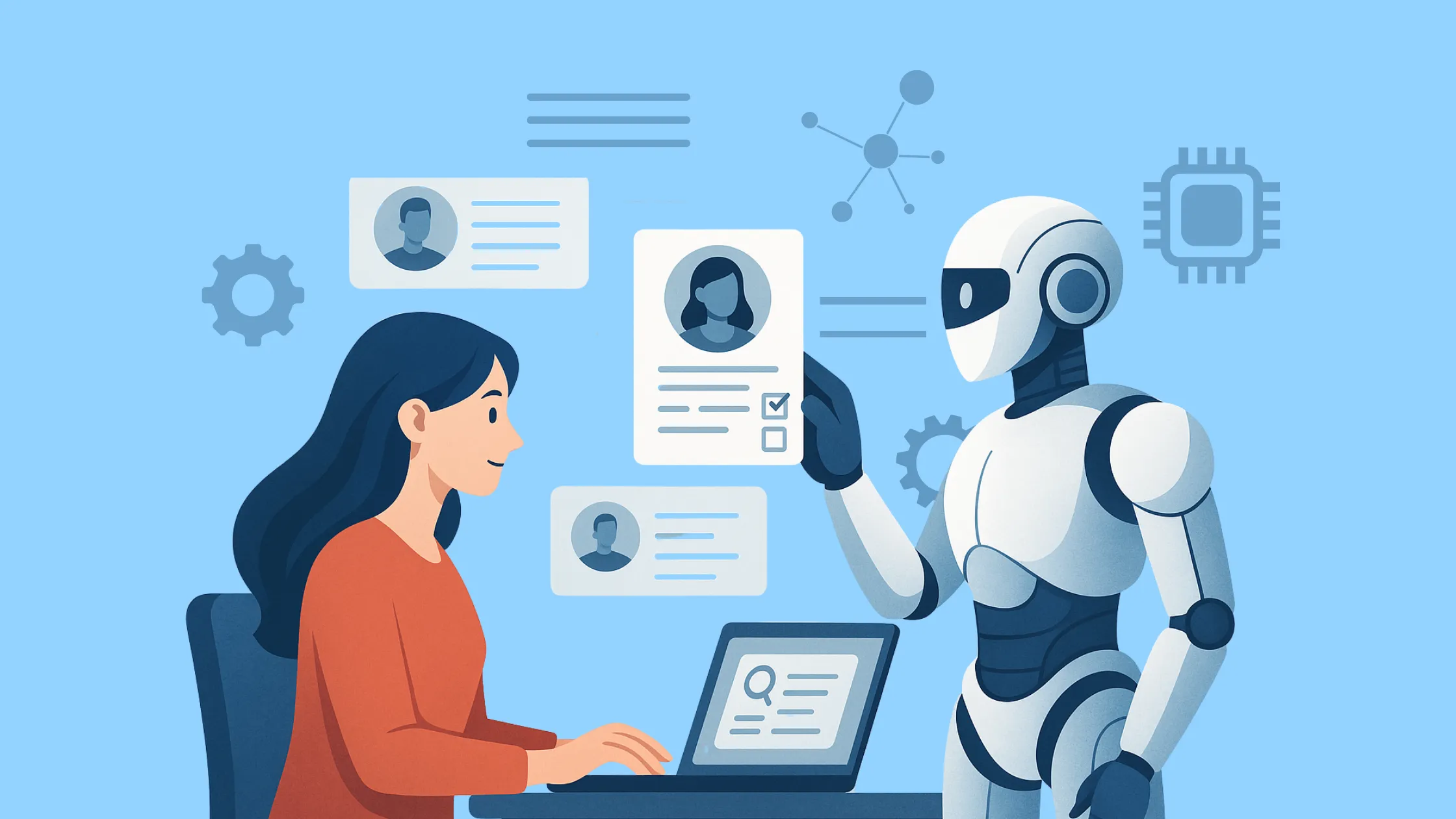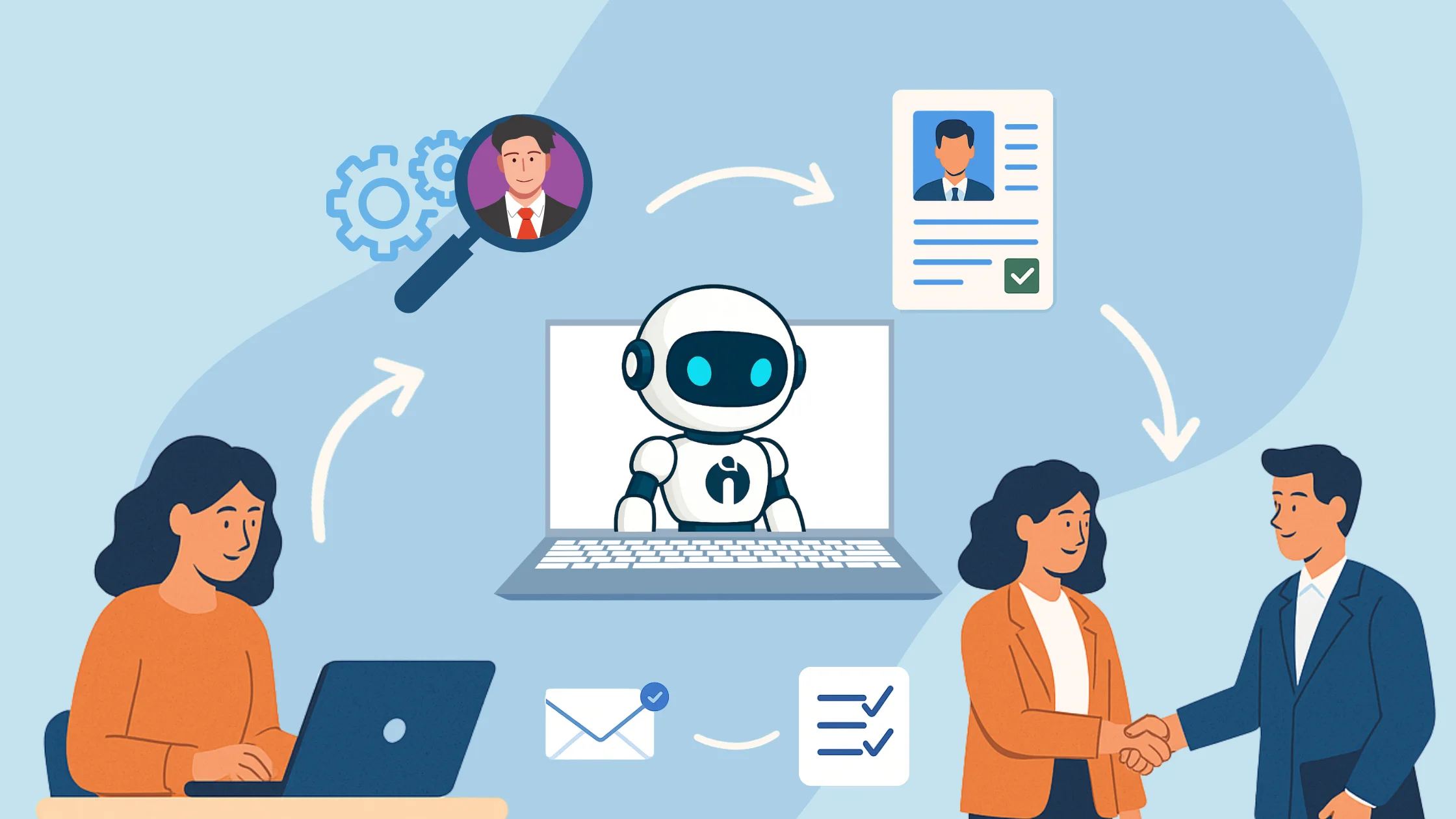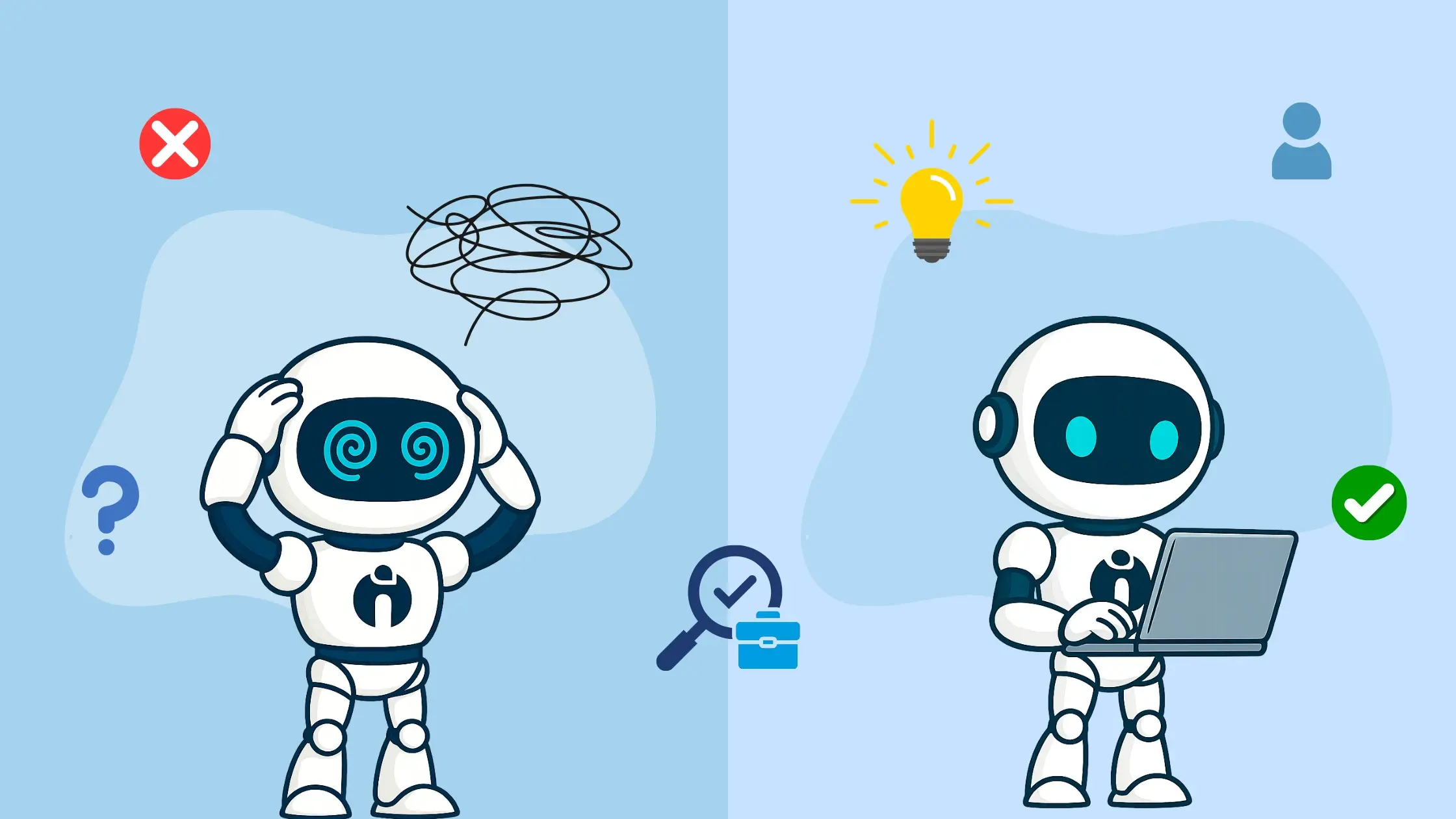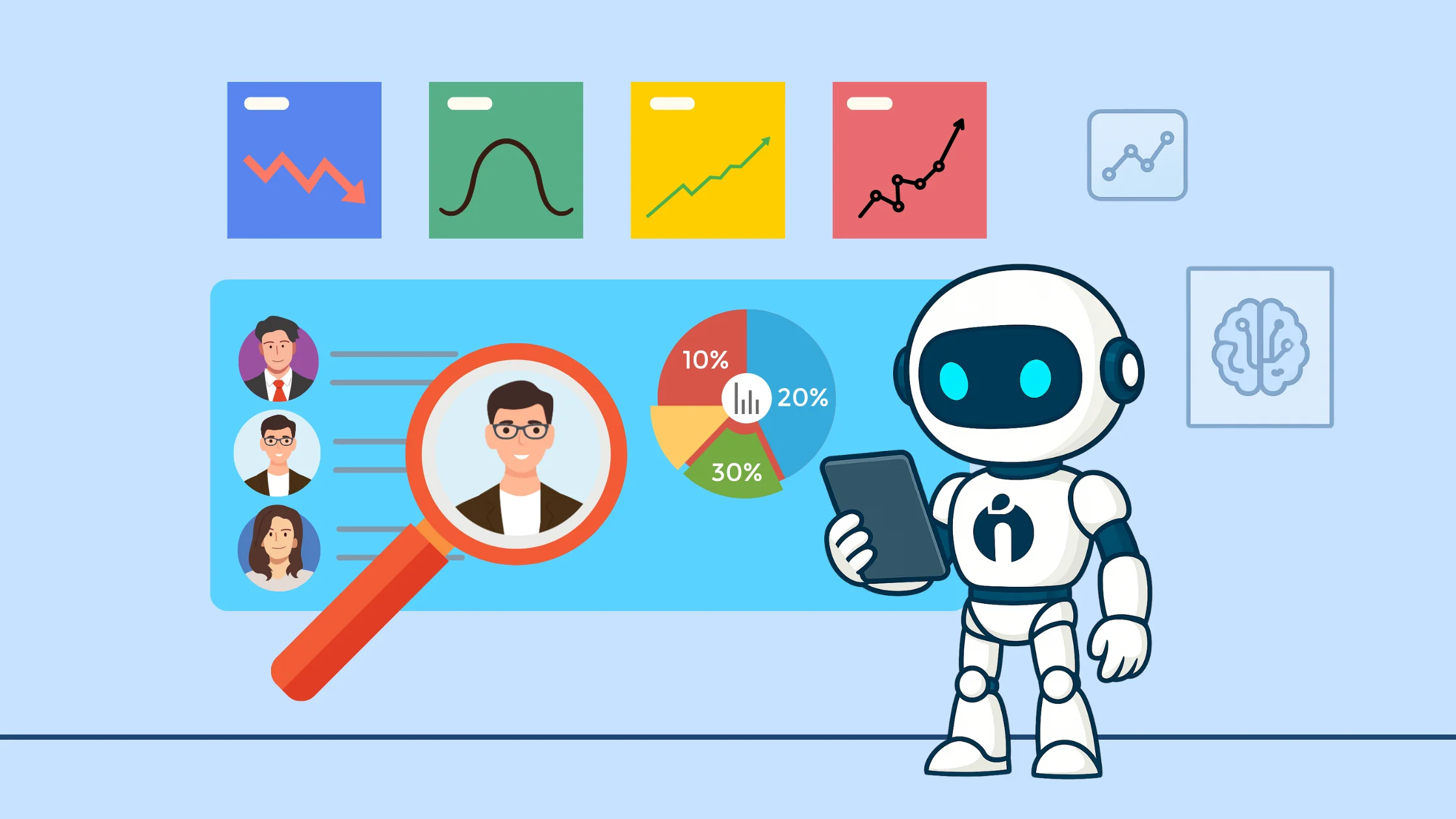TL;DR
- AI is transforming recruiters from administrative roles to strategic talent partners.
- Automation of routine tasks like resume screening and interview scheduling allows more focus on candidate consultation and relationship building.
- Recruiters need new skills, including AI tool management, data analysis, emotional intelligence, and strategic thinking.
- AI aids proactive talent strategy, candidate advocacy, and experience design, enhancing recruitment quality and efficiency.
Picture this: It’s Monday morning, and instead of going through 500 CVs, you’re discussing long-term talent needs with your hiring manager. Screening is complete, candidates are ranked, and interviews are scheduled automatically. This isn’t a dream; it’s the new AI-powered reality for recruiters.
AI recruitment agents are changing how we hire. They are redefining the recruiter’s role. Recruiters are moving from sorting CVs to becoming strategic talent partners. They focus on building relationships, improving candidate experience, and planning for the workforce. This shift is not about replacing humans. It’s about improving human potential with AI-driven efficiency.
Ready to discover how this revolution is reshaping your profession? Let's explore how AI is transforming the recruiter role and what this means for recruitment professionals who want to thrive in this new landscape.
Traditional Recruiter vs. AI-Enhanced Recruiter
Before AI: The Administrative Recruiter
Traditional recruiters spent 60-70﹪ of their time on:
-
Manually screening hundreds of resumes
-
Making countless phone calls for basic qualification checks
-
Scheduling interviews through back-and-forth emails
-
Posting jobs on multiple boards individually
-
Creating basic candidate reports
-
Following up on application statuses
After AI: The Strategic Talent Partner
Modern AI-enhanced recruiters now focus on:
-
Strategic workforce planning and talent forecasting
-
Building relationships with valuable candidates
-
Assessing cultural fit and evaluating soft skills
-
Branding the employer and designing candidate experiences
-
Making decisions based on AI insights
-
Engaging in complex negotiations and advising candidates
According to McKinsey & Company Report, 92% of companies plan to invest more in gen AI over the next 3 years.
How AI Recruitment Agents Are Changing Daily Tasks for Recruiters?
1. From Resume Screening to Candidate Consultation
Before AI: Recruiters manually reviewed over 200 resumes per position, spending 30 seconds on keyword matching for each one.
With AI: AI agents can screen thousands of applications in minutes, allowing recruiters to spend over 30 minutes with each qualified candidate to understand their career goals, motivations, and cultural preferences.
New Focus: In-depth candidate consultation, career counselling, and relationship building with top talent.
2. From Job Posting to Talent Community Building
Before AI: Recruiters posted jobs and waited for applications.
With AI: AI agents actively source passive candidates across platforms, helping recruiters maintain ongoing relationships with talent communities.
New Focus: Creating talent networks, nurturing relationships with passive candidates, and promoting the employer brand among industry experts.
3. From Interview Scheduling to Strategic Assessment Design
Before AI: Recruiters spent hours coordinating calendars and sending scheduling emails.
With AI: Automated scheduling systems manage coordination, allowing recruiters to develop comprehensive assessment strategies.
New Focus: Crafting behavioural interview frameworks, designing cultural fit assessments, and creating candidate evaluation matrices that cannot be replicated by AI.
The New Recruiter Skill Set in the AI Era
Technical Skills Recruiters Now Need
-
AI Tool Management: Understanding how to set up, monitor, and improve AI recruitment platforms
-
Data Analysis: Interpreting AI-created insights, conversion metrics, and predictive analytics
-
Technology Integration: Managing AI tools within existing HR technology systems
Enhanced Human Skills in Demand
-
Emotional Intelligence: Understanding what candidates truly want
-
Strategic Thinking: Planning long-term workforce needs and talent pipelines
-
Consultative Selling: Presenting opportunities that attract top passive candidates
-
Negotiation Expertise: Handling complex salary and benefits negotiations
-
Cultural Assessment: Evaluating soft skills and team dynamics
5 Ways AI Is Improving the Recruiter's Strategic Role
1. From Reactive Hiring to Proactive Talent Strategy
Traditional Role: Waiting for hiring managers to ask for candidates for open positions.
AI-Enhanced Role: Using predictive analytics to anticipate hiring needs, identify skill gaps beforehand, and build talent pipelines proactively.
Impact: Recruiters become strategic advisors who help organisations get ready for future talent requirements instead of scrambling to fill urgent openings.
2. From Candidate Screening to Candidate Advocacy
Traditional Role: Filtering out unqualified candidates.
AI-Enhanced Role: Advocating for qualified candidates and guiding them through the hiring process.
Impact: Recruiters build stronger connections with top talent, improving acceptance rates and the employer’s reputation.
3. From Individual Contributor to Talent Consultant
Traditional Role: Working alone to fill assigned positions.
AI-Enhanced Role: Consulting with leadership teams on talent strategy, market conditions, and competitive information.
Impact: Recruiters become trusted advisors who influence hiring strategy and organisational planning.
4. From Process Executor to Experience Designer
Traditional Role: Following set recruitment processes.
AI-Enhanced Role: Designing personalised candidate experiences that reflect company culture and values.
Impact: Recruiters create meaningful interactions that attract top talent and enhance the employer brand.
5. From Quantity Focus to Quality Partnership
Traditional Role: Measured by the number of positions filled and time-to-fill metrics.
AI-Enhanced Role: Measured by hire quality, retention rates, and the long-term success of candidates.
Impact: Recruiters concentrate on finding the right cultural and skill fit rather than filling positions quickly.
Real-World Examples: How Recruiters’ Days Have Changed
Sarah, Tech Recruiter - Before AI
8:00 AM - 10:00 AM: Manual resume screening for 3 open positions
10:00 AM - 12:00 PM: Phone screens with 6 candidates
1:00 PM - 3:00 PM: Scheduling interviews and sending emails
3:00 PM - 5:00 PM: Updating the candidate tracking system and writing reports
Sarah, Tech Recruiter - With AI
8:00 AM - 9:00 AM: Review AI-generated candidate insights and recommendations
9:00 AM - 11:00 AM: In-depth consultation calls with 3 pre-qualified candidates
11:00 AM - 12:00 PM: Strategic planning session with hiring managers
1:00 PM - 3:00 PM: Building a talent community and maintaining relationships
3:00 PM - 5:00 PM: Employer branding activities and optimising candidate experience
What are the Challenges Recruiters Face During Transformation?
1. Skill Gap Anxiety
Many recruiters worry about needing the technical and strategic skills for AI-enhanced roles.
Solution: Continuous learning and developing skills in data analysis, AI tool management, and strategic planning.
2. Role Relevance Concerns
Some recruiters fear being replaced by AI recruitment agent.
Reality: AI supports human abilities rather than replacing them. The demand for strategic recruitment talent is actually growing.
3. Technology Adaptation
Learning to work with AI tools and effectively understand their insights.
Approach: Start with user-friendly AI platforms and gradually develop technical skills.
The Future Recruiter: What's Coming Next?
Emerging Recruiter Roles
-
Talent Intelligence Analyst: Interpreting AI data to guide hiring strategy
-
Candidate Experience Architect: Designing personalised recruitment journeys
-
Workforce Futurist: Anticipating and preparing for future skill needs
-
AI Recruitment Trainer: Teaching AI systems to improve hiring outcomes
Skills Recruiters Will Need by 2027
-
Advanced data interpretation and visualisation
-
AI prompt engineering for recruitment use
-
Collaboration with AI developers
-
Strategic workforce planning and scenario modelling
How to Succeed as a Recruiter in the AI Era?
1. Embrace AI as Your Partner
See AI as a tool that enhances your skills instead of threatening your position.
2. Develop Your Human Skills
Concentrate on emotional intelligence, relationship building, and strategic thinking, skills that AI cannot replicate.
3. Become Data-Savvy
Learn how to understand AI insights and use data for smarter recruitment decisions.
4. Specialise in High-Value Areas
Position yourself as an expert in areas like executive search, culture assessment, or talent strategy.
5. Build Your Employer Brand Expertise
Help organisations attract talent with strong employer branding and candidate experience design.
Measuring Success: New Metrics for AI-Enhanced Recruiters
Traditional Metrics
-
Time-to-fill
-
Number of positions filled
-
Cost-per-hire
New AI-Era Metrics
-
Quality of hire scores (performance ratings after 6-12 months)
-
Retention rates of recruited candidates
-
Candidate satisfaction scores throughout the recruitment process
-
Hiring manager satisfaction with recruited talent
-
Strength of the talent pipeline (relationships with passive candidates)
-
Strategic impact (proactive hiring versus reactive filling)
Track your recruitment success with our AI-powered analytics Dashboard.
Conclusion
AI recruitment agents are not devaluing the recruiter’s role; they are enhancing it. By automating routine tasks, AI enables recruiters to focus on building relationships, making strategic decisions, and bringing human insight to the hiring process.
Recruiters who will excel in this new era are those who embrace AI as a valuable partner, continuously improve their strategic and interpersonal skills, and position themselves as crucial talent allies within their organisations.
The future belongs to recruiters who can combine AI’s efficiency with human understanding, creating recruitment experiences that attract, engage, and retain top talent in a competitive market.
At iSmartRecruit, we make this transition simple and effective. Our AI-powered recruitment software automates screening, improves candidate engagement, and offers useful insights. This helps you hire faster and smarter while keeping the human element.
FAQs - Frequently Asked Questions
How does AI change the daily tasks of recruiters?
AI automates repetitive tasks like resume screening and interview scheduling. This frees up recruiters to focus on candidate consultation, building talent communities, and designing assessment strategies to improve hiring quality.
Will AI replace recruiters in the future?
No, AI is a tool that enhances recruiters’ abilities. It supports human insight and strategic decision-making, making recruiters more valuable as talent partners rather than replacing them.
What new skills do recruiters need in the AI era?
Recruiters should develop skills in AI tool management, data analysis, emotional intelligence, strategic thinking, and consultative selling to thrive alongside AI.
How can iSmartRecruit help with AI recruitment?
iSmartRecruit offers AI-powered recruitment software that automates screening, enhances candidate engagement, and provides actionable insights. This supports recruiters to hire faster and smarter while maintaining a personal touch.













